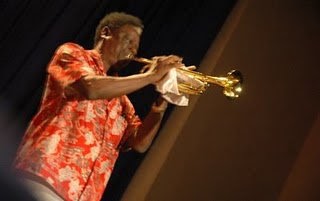Producer: Oluwole Ojojolu
Director: Seun Olaiya
D.O.P: Wale Lawal
Executive Producer: Oluwole Ojojolu.
Production Company: Empire Optimum Communications.

ORI OLOKUN
BABA WANDE's arrival @ the location
From the stables of Oluwole Ojojolu owned EMPIRE OPTIMUM COMMUNICATIONS producer of ORANMIYAN and ODUDUWA comes another Yoruba traditional bluckbuster ORI OLOKUN (a multimillion naira worth of project), this is the story of a town in the ancient days called 'AWARA' it was a peaceful town with happy and lively people until the death of its king, the influencial citizens of the town were fighting for the post of AFOBAJE (the king maker) which happens to be the most powerful position in the town after the king.
Power tussle, political power play, rancour and chaos became the order of the day.
Empire 4 Action
ARA and OLUWOLE OJOJOLU@ the location.
ORI OLOKUN coming soon to a cinema near you.......















